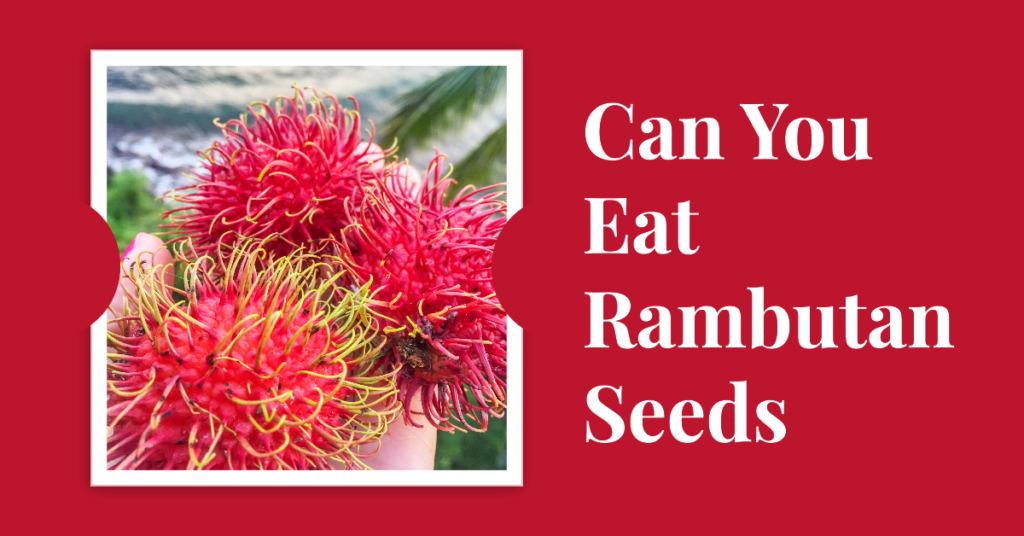Ever wondered if you can eat rambutan seeds? Well, the juicy fruit might be a summer favorite, but what about those little seeds inside? Are they edible or should you toss them away? With rambutan seed powder, roasted rambutan seed powder, and other products popping up in health stores, it’s worth exploring the question can eat rambutan seeds?.
As you dig deeper into the world of rambutan seeds, you’ll come across terms like tannins, saponins, fats, and alkaloids. So, let’s unravel the mystery and find out if you can satisfy your curiosity by indulging in these fruity seeds or if it’s best to stick to just the flesh.

Overview
Rambutan, a tropical fruit native to Southeast Asia, is known for its vibrant red skin and sweet, juicy flesh. But what about its seeds? Are they edible too? In this article, we’ll explore the edibility of rambutan seeds, their nutritional value, preparation methods, potential risks and side effects, digestibility, and culinary uses.
Nutritional Value and Health Benefits
Rambutan seeds are a rich source of nutrients and offer several health benefits. They contain a good balance of macronutrients, such as carbohydrates, proteins, and fats. Additionally, they are packed with micronutrients and phytochemicals, including calcium, iron, phosphorus, and vitamin C. These nutrients play vital roles in maintaining overall health and well-being.
Some of the potential health benefits associated with rambutan seeds include boosting the immune system, promoting healthy digestion, supporting bone health, and providing antioxidant protection. However, it’s important to note that further research is needed to fully understand and validate these potential benefits.
Preparation Methods
Before consuming rambutan seeds, proper preparation is essential. Start by cleaning and washing the seeds thoroughly to remove any dirt or residues. You can then choose from various preparation methods, such as boiling, steaming, roasting, or drying.
Boiling or steaming rambutan seeds can help soften their outer layer and make them easier to eat. Once cooked, you can consume them directly or incorporate them into various dishes. Alternatively, you can roast or dry the seeds to enhance their flavor and texture. Roasted rambutan seed powder, in particular, can be used as an ingredient in cooking or as a seasoning.
Potential Risks and Side Effects
While rambutan seeds have nutritional benefits, it’s important to be aware of potential risks and side effects. Some individuals may experience allergic reactions to rambutan seeds, especially if they have previously shown allergies to other fruits or seeds. It’s advisable to perform a small patch test before consuming rambutan seeds if you have a known history of allergic reactions.
Additionally, rambutan seeds contain toxins that can be harmful if consumed in excessive amounts. It’s recommended to consume them in moderation and avoid eating large quantities at once. Overconsumption of rambutan seeds may lead to digestive issues, such as abdominal discomfort or diarrhea. If you experience any adverse reactions after consuming rambutan seeds, it’s important to seek medical attention.
Digestibility
The digestibility of rambutan seeds can vary from person to person. Some individuals may find the seeds easily digestible, while others may experience difficulties in breaking them down. It’s worth noting that the outer layer of the seed can be tough and fibrous, making it harder to digest.
To improve the digestibility of rambutan seeds, you can try soaking them in water overnight before consumption. This can help soften the outer layer and make them easier to digest. Additionally, thoroughly cooking or roasting the seeds can also contribute to increased digestibility.
Cooking and Culinary Uses
Rambutan seeds have a long history of culinary use in Southeast Asian cuisines. In traditional dishes, they are often incorporated into soups, stews, curries, and desserts. The seeds can add a unique texture and flavor, enhancing the overall culinary experience.
Furthermore, rambutan seeds can be creatively used in various recipes and techniques. They can be ground into a fine powder and used as an ingredient in baked goods, smoothies, or protein shakes. Roasted rambutan seed powder, in particular, can impart a rich, nutty flavor to dishes or act as a seasoning.
Roasted Rambutan Seed Powder
Making roasted rambutan seed powder is a simple process that can unlock a world of culinary possibilities. After cleaning and washing the seeds, they are roasted until they turn a deep golden brown. Once cooled, they can be ground into a fine powder using a blender or spice grinder.
Roasted rambutan seed powder can be stored in an airtight container for future use. Its unique flavor profile adds depth to various dishes, including soups, sauces, marinades, and even homemade ice cream. The powder can also be sprinkled over salads or roasted vegetables to elevate their taste.
Tannins in Rambutan Seeds
Rambutan seeds contain tannins, which are natural compounds found in various plant-based foods. Tannins contribute to the astringent or bitter taste often associated with certain fruits, vegetables, and beverages. While tannins have certain health effects, their presence in rambutan seeds can affect the overall flavor profile.
In terms of health effects, tannins may have antimicrobial, anti-inflammatory, and antioxidant properties. However, excessive consumption of tannins can lead to digestive issues, such as constipation or stomach discomfort. It’s important to consume rambutan seeds in moderation to avoid potential adverse effects related to tannin content.
Saponins in Rambutan Seeds
Another compound found in rambutan seeds is saponins. Saponins are natural plant chemicals that have various biological properties. They can produce a soapy texture when dissolved in water, hence their name.
While saponins are generally considered safe for consumption, high levels of saponins in certain foods may have adverse effects. Rambutan seeds contain saponins, but their levels are typically low and not likely to cause any harm when consumed in moderation.
Fats in Rambutan Seeds
Rambutan seeds also contain fats, primarily in the form of oils. These fats provide a source of energy and contribute to the overall nutritional value of the seeds. The specific composition of fats in rambutan seeds can vary, but they typically consist of a mixture of saturated, monounsaturated, and polyunsaturated fats.
It’s important to note that while fats are an essential part of a balanced diet, they should be consumed in moderation. The fat content in rambutan seeds should be considered as part of your overall fat intake for the day.
Alkaloids in Rambutan Seeds
Alkaloids are naturally occurring compounds found in numerous plant species. Some alkaloids have psychoactive properties, while others possess medicinal benefits. Rambutan seeds contain trace amounts of alkaloids, although the specific types and concentrations may vary.
The presence of alkaloids in rambutan seeds may have potential effects on the body, such as stimulating the central nervous system or acting as analgesics. However, further research is needed to fully understand the effects and potential uses of alkaloids in rambutan seeds.
In conclusion, rambutan seeds can be safely consumed when properly prepared. They offer a range of nutrients and potential health benefits. However, it’s important to consume them in moderation and be aware of potential risks and side effects. The culinary uses of rambutan seeds are diverse, and they can be incorporated into various dishes to add flavor and texture. So go ahead, give rambutan seeds a try and discover new culinary delights!

Hi, I’m King Phils, a Dragon Fruit enthusiast and blogger. Welcome to my website, where I share everything I know and love about this amazing fruit.